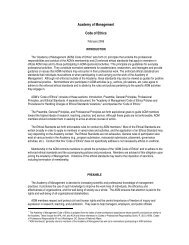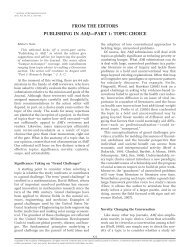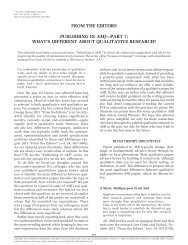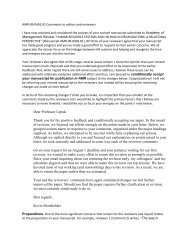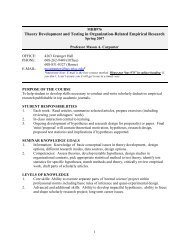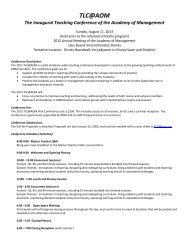inductive reasoning and the creation and justification of new ventures
inductive reasoning and the creation and justification of new ventures
inductive reasoning and the creation and justification of new ventures
You also want an ePaper? Increase the reach of your titles
YUMPU automatically turns print PDFs into web optimized ePapers that Google loves.
2010 Cornelissen <strong>and</strong> Clarke<br />
545<br />
well as how an entrepreneur uses analogical or<br />
metaphorical <strong>reasoning</strong> during <strong>the</strong> initial<br />
stages <strong>of</strong> exploring ideas <strong>and</strong> planning <strong>and</strong><br />
launching a venture. Indeed, in <strong>the</strong> initial<br />
stages <strong>of</strong> a venture, entrepreneurs squarely rely<br />
on analogical <strong>and</strong> metaphorical <strong>reasoning</strong> to<br />
create <strong>the</strong> opportunity for <strong>new</strong> <strong>ventures</strong> <strong>and</strong> to<br />
set <strong>the</strong>se apart from what already exists while<br />
locating <strong>the</strong>ir ideas within stakeholders’ existing<br />
underst<strong>and</strong>ings in order to gain acceptance<br />
<strong>and</strong> support (Hargadon & Douglas, 2001; Santos<br />
& Eisenhardt, 2009). After <strong>the</strong> launch, <strong>and</strong> when<br />
<strong>the</strong> venture achieves a turnover <strong>and</strong> early<br />
growth as indicators <strong>of</strong> its pr<strong>of</strong>it-making ability<br />
(Hite & Hesterley, 2001; Zimmerman & Zeitz,<br />
2002), entrepreneurs generally become less reliant<br />
on <strong>inductive</strong> <strong>reasoning</strong>. Instead, <strong>the</strong>y<br />
may shift to more calculated <strong>reasoning</strong> that is<br />
based on direct experiences <strong>and</strong> <strong>the</strong> performance<br />
<strong>of</strong> <strong>the</strong> <strong>new</strong> venture in its industry (Aldrich<br />
& Fiol, 1994; Hargadon & Douglas, 2001;<br />
Hill & Levenhagen, 1995).<br />
In <strong>the</strong> next section we unfold <strong>the</strong>se arguments<br />
<strong>and</strong> illustrate our main propositions with case<br />
examples <strong>of</strong> novel <strong>ventures</strong> in nascent markets<br />
that emerged through <strong>the</strong> confluence <strong>of</strong> <strong>the</strong> computing,<br />
electronics, <strong>and</strong> telecommunication industries<br />
in <strong>the</strong> mid 1990s (Santos & Eisenhardt,<br />
2009). Santos <strong>and</strong> Eisenhardt’s (2009) original<br />
study described how entrepreneurs framed <strong>the</strong><br />
existence <strong>of</strong> novel markets <strong>and</strong> subsequently signaled<br />
<strong>the</strong> leadership <strong>and</strong> feasibility <strong>of</strong> <strong>the</strong>ir <strong>ventures</strong><br />
in <strong>the</strong>se markets. We shed <strong>new</strong> light on <strong>the</strong>ir<br />
cases by demonstrating how <strong>the</strong>y exemplify <strong>the</strong><br />
main <strong>inductive</strong> processes <strong>and</strong> determinants<br />
within <strong>the</strong> initial stages <strong>of</strong> venture <strong>creation</strong>.<br />
PRIOR EXPERIENCE AND<br />
INDUCTIVE REASONING<br />
Goodman (1955) gave a well-known account <strong>of</strong><br />
<strong>the</strong> basis <strong>of</strong> <strong>inductive</strong> <strong>reasoning</strong>—one pointing<br />
toward <strong>the</strong> historical practices <strong>and</strong> experiences<br />
<strong>of</strong> entrepreneurs, particularly <strong>the</strong>ir language<br />
use ra<strong>the</strong>r than simply <strong>the</strong>ir psychology (Sloman<br />
& Lagnado, 2005). He claimed that induction may<br />
consist <strong>of</strong> a mental habit formed by past observations<br />
<strong>and</strong> experiences but that language is<br />
driving whatever past regularities are selected<br />
<strong>and</strong> thus projected onto a novel or future situation.<br />
Goodman (1955) specifically argued that<br />
<strong>the</strong> entrenchment <strong>of</strong> language affects <strong>inductive</strong><br />
<strong>reasoning</strong>. In short, entire verbal descriptions or<br />
specific words are entrenched when <strong>the</strong>y <strong>and</strong><br />
<strong>the</strong>ir metaphorical extensions have historically<br />
figured in this usage.<br />
Applied to entrepreneurship, this means that<br />
through depth <strong>of</strong> experience in or through learning<br />
about one or multiple industries, entrepreneurs<br />
may have entrenched descriptions <strong>of</strong> <strong>the</strong><br />
key features driving success or performance in a<br />
particular industry (e.g., Baron & Ensley, 2006;<br />
Gavetti et al., 2005; Haunschild & Miner, 1997).<br />
For example, based on depth <strong>of</strong> experience in<br />
<strong>the</strong> media industry, an entrepreneur may verbally<br />
describe <strong>the</strong> industry as one where “advertising<br />
is key because intrinsic product quality<br />
is hard to assess, <strong>and</strong> <strong>the</strong>refore customers’<br />
taste is easily shapeable” (Gavetti & Warglien,<br />
2007: 7). Depth <strong>of</strong> experience refers to <strong>the</strong> time<br />
spent by an entrepreneur operating in or learning<br />
about a particular industry (Gavetti et al.,<br />
2005). The principle <strong>of</strong> entrenchment suggests<br />
first <strong>of</strong> all that those entrepreneurs with depth <strong>of</strong><br />
experience in industries deemed relevant to <strong>the</strong><br />
<strong>new</strong> venture will refer to <strong>the</strong>ir past descriptions<br />
<strong>of</strong> those industries <strong>and</strong> will analogically project<br />
<strong>the</strong>se onto <strong>the</strong> novel venture as a working hypo<strong>the</strong>sis.<br />
This also implies that novice entrepreneurs<br />
or those without experience in relevant<br />
industries do not have any direct analogies to<br />
h<strong>and</strong> <strong>and</strong> <strong>the</strong>refore face a clear sensemaking<br />
imperative (Santos & Eisenhardt, 2009; Sarasvathy,<br />
2004). As a consequence, <strong>the</strong>se entrepreneurs<br />
are likely to draw on entrenched, idiomatic<br />
words or expressions in <strong>the</strong>ir speech that<br />
<strong>the</strong>y metaphorically extend to <strong>the</strong> <strong>new</strong> venture<br />
as a way <strong>of</strong> creating underst<strong>and</strong>ing for <strong>the</strong>mselves<br />
<strong>and</strong> o<strong>the</strong>rs (e.g., Cardon et al., 2005; Dodd,<br />
2000; Nicholson & Anderson, 2005). Specifically,<br />
we argue that in <strong>the</strong> absence <strong>of</strong> directly relevant<br />
prior experiences <strong>and</strong> observations, entrepreneurs<br />
will induce metaphors to suggest an opportunity<br />
<strong>and</strong> to construct a basic scenario for <strong>the</strong><br />
<strong>creation</strong> <strong>and</strong> commercialization <strong>of</strong> a <strong>new</strong> venture<br />
in an unfamiliar industry (Hill & Levenhagen,<br />
1995; Sarasvathy, 2004). This leads to our<br />
first proposition.<br />
Proposition 1: The degree to which entrepreneurs<br />
have depth <strong>of</strong> experience<br />
in industries related to <strong>the</strong> target industry<br />
for <strong>the</strong> <strong>new</strong> venture is associated<br />
with <strong>the</strong> use <strong>of</strong> analogies (presence)<br />
or metaphors (absence) when



